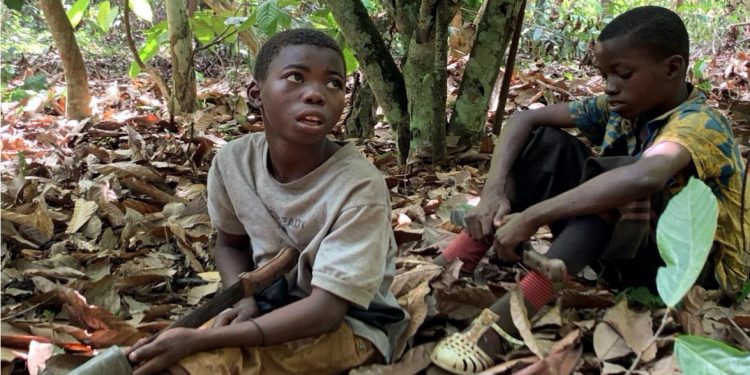The world’s largest chocolate makers have been named in a US lawsuit by eight former child slaves, trafficked from Mali into forced labour on cocoa plantations in the Ivory Coast.
It’s a federal class action on behalf of all children facing similar exploitation, filed in Washington DC by International Rights Advocates. All the defendant companies, Nestlé, Cargill, Barry Callebaut, Mars, Olam, Hershey, and Mondelēz, are US corporate residents.
The plaintiffs were trafficked from as young as 11, forced to work without pay for up to five years; they still have visible machete scars. Fed so little they suffered malnourishment, they slept and worked in conditions regularly exposing them to deadly snakes, and they were made to work in highly dangerous conditions with machetes, pesticides and heavy loads.
The suit says that collectively the defendant companies buy about 70 per cent of the cocoa harvested in Ivory Coast. It says the defendants have first-hand knowledge of child slavery and between them have the market clout to eradicate it.
However, they operate with “the unilateral goal of finding the cheapest source of cocoa”.
Terry Collingsworth, Executive Director of IRAdvocates, said, “We want these companies to know we will use every possible legal tool available to make them stop using child slaves.
“Seventy to 80 per cent of the cocoa purchased by the defendants is free zone, unregulated”
“We call on the companies to work with us to solve this problem, rather than spend millions in legal fees to fight an uncontestable fact – the cocoa industry is dependent on child labour…
“Allowing the enslavement of African children in 2021 to harvest cocoa for major multinational companies is outrageous and must end. Enough is enough.”
While Nestlé, Mars and Hershey are brands easily recognised by consumers, they might not be aware that Mondelēz owns the well-known Cadbury brand. Barry Callebaut is a supplier to Tony’s Chocolonely, a company founded with the express purpose of removing slavery from the supply chain.
The eight plaintiffs are Issouf Coubaly, Sidiki Bamba, Tenimba Djamoutene, Oudou Ouattara, Ousmane Ouattara, Issouf Bagayoko, Arouna Ballo, and Mohamed Traore.
The treatment of each plaintiff is described in the suit, under V. Harm to individual plaintiffs.
One example explains how Ousmane Ouattara was 14 and Issouf Bagayoko was 13 when they were approached by a labour broker, who promised them work and put them on a bus.
“They were the only two workers on the plantation. Both have visible machete scars”
They ended up in the southwest of Ivory Coast, near the border with Liberia, in an area known as the “wild west” of cocoa production, because of its many unregulated, free zone plantations.
Seventy to 80 per cent of the cocoa purchased by the defendant companies is free zone, much of which comes from this area.
They were offered 100,000 West African CFA francs each, about US$200, to work until the harvest, when they would be paid.
They were the only two workers on the 12 hectare plantation, clearing brush, applying pesticides and fertiliser without protective gear, cutting down the pods, opening them, collecting and drying beans. Both have visible scars from machete accidents.
At the end of the season, they were refused pay and told to keep working for their food. But the owner of a neighbouring plantation had been killed in a local land conflict, so they fled in fear.
“Fair Trade and Rainforest Alliance participate in this fraud”
Penniless, the children walked to Grabo and relied on bus drivers to take them for free, pay to get them through the checkpoint at the Mali border, and provide them with some food.
While all the defendants are expected to expostulate against child slavery, their record on the issue continues to worsen, according to IRAdvocates. The firms had signed the Harkin-Engle Protocol in 2001, promising to stop using child labour by 2005.
But the suit refers to an October 2020 report saying more than two million children are now harvesting cocoa and the number of child slaves in the supply chain has steadily continued to rise.
It also says that groups like Fair Trade and Rainforest Alliance “participate in this fraud” by labelling all company partners’ cocoa as meeting their standards. It says, “Only 20 to 30 per cent at most is even being partially monitored… these so-called fair trade initiatives mislead the public by creating the false impression that they are certifying cocoa as child-labor-free when they do not in fact assess the extent of child labour in their member companies’ production.”
It says Nestlé’s claim to have helped 5,232 children in its cocoa supply chain, which also includes Ghana, is 0.002%, two-one thousandths of one percent, of the child labor in Ivory Coast alone.
IRAdvocates filed a case on behalf of six former child slaves against Nestlé and Cargill in 2005 which was argued in the Supreme Court in December last year. Nestlé and Cargill said they are immune from liability for child slavery under international law.























